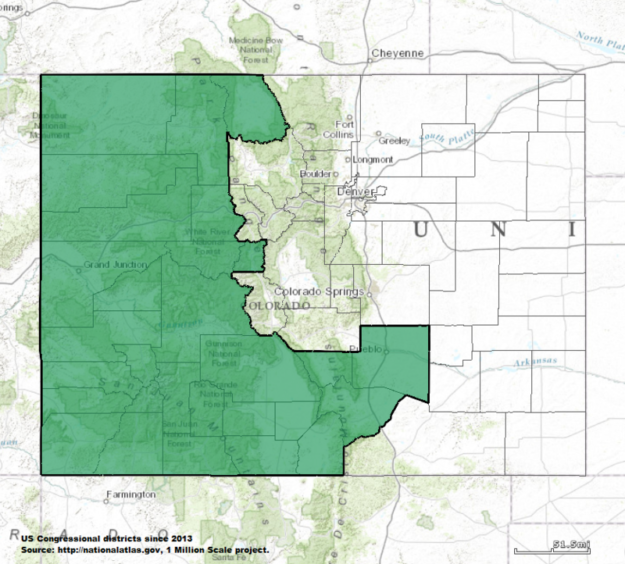Widgetized Section
Go to Admin » Appearance » Widgets » and move Gabfire Widget: Social into that MastheadOverlay zone
Colorado could get eighth congressional seat through redistricting, but citizenship question on census critical

In a RealVail.com article that first posted in the Vail Daily on Monday, Metropolitan State University of Denver political science professor Robert Preuhs said there’s a chance Colorado will get another seat in the U.S. House of Representatives for the 2022 election cycle.
An eighth Colorado congressional seat (we have seven right now, plus the unchanging two U.S. Senate seats) would come at the expense of another state that either hasn’t seen the same kind of population growth Colorado has in recent years or in fact has actually been losing residents, because the overall total of 435 House seats stays the same.
But what will determine whether Colorado gets that eighth seat is the 2020 U.S. Census, which has been plagued with controversy because of the addition by U.S. Commerce Secretary Wilbur Ross of a direct citizenship question, which opponents say will scare people away from talking to census takers because of the current administration’s stepped-up immigration enforcement.
Citizenship has a been a topic of the census in the past, but not in the form of such a direct question. And besides deciding congressional districts, census data are used to determine the allocation of federal funds to states for a wide range of government services.
In Colorado, an eighth congressional district would be a big deal, giving our state added power in Congress, and it also might have a local impact, with Eagle County currently split between the state’s 2nd and 3rd congressional districts. In 2018, voters passed Amendments Y & Z, changing how we conduct redistricting – and making an eighth House seat even more intriguing.
MSU’s Preuhs says an accurate count of Colorado residents – both citizens and noncitizens – could play into that possible eighth seat.
“It’s all based on the census, which is why the census and citizenship questions and whether you use a hard head count or a statistical inference to determine those population numbers is part of the fight as well,” Preuhs said.
“That’s a big deal for Southwest and Mountain West states where we have actually a fairly large noncitizen population. Some of the East Coast states and some of the kind of less traditional immigrant destination states, not so much,” he added.
Preuhs added the citizenship question could have an outsized impact on the Western Slope.
“Across the entire state of Colorado, a large number of noncitizens still live in the Front Range corridor, but proportionally those numbers are larger — in some ways, just in terms of high numbers but relatively small population overall – on the Western Slope,” Preuhs said.
The U.S. Supreme Court likely has already decided in favor of adding the citizenship question after hearing arguments in April and appearing to agree with the administration’s case. The court will issue an opinion by the end of this month. On Monday, the Justice Department pushed back against assertions the process has been politicized to favor Republicans.
Now here’s the entirety of Monday’s Vail Daily story on the 3rd Congressional District:
Dems strategize to take out Tipton in CD3
Party’s best hope in GOP stronghold may be redistricting
With another Democrat eyeing a potential 2020 rematch in Colorado’s 3rd Congressional District, the debate has already started in political punditry circles about what kind of candidate can realistically challenge five-term incumbent Republican Scott Tipton – or whether the Dem’s only real hope is redistricting in 2022.

Glenwood Springs attorney Karl Hanlon recently told the Vail Daily he’s considering another primary challenge of former state Rep. Diane Mitsch Bush, who last week formally announced she’s seeking a rematch with Tipton in CD3. Mitsch Bush beat Hanlon 64.1% to 27.7% in the 2018 Democratic primary – only to lose to Tipton 51.5% to 43.6% in the general election.
Since the 2010 election when Tipton upset moderate Democrat John Salazar by 4.6% in the largely rural, conservative district that stretches from Grand Junction to Pueblo and includes most of the state’s Western Slope, the closest any Democrat has come to unseating Tipton was Mitsch Bush losing by 7.9% percent in 2018.
Two Hispanic male state lawmakers from Pueblo – Sal Pace and Abel Tapia — lost to Tipton by margins of 12.3% and 22.3% respectively in 2012 and 2014, and then former state Sen. Gail Schwartz of Crested Butte lost to Tipton by a 14.3% margin in 2016. The majority of CD3 voters are independent (37%), with Republicans (33%) outnumbering Democrats (28%).

The district includes all or part of 29 of the 64 Colorado counties. The one part is the western two-thirds of Eagle County. Residents of CD3 overwhelmingly (88%) identify as white, with another 24% identifying as Hispanic – meaning some percentage of people identify as both.
No white male candidate has challenged Tipton since he upset Salazar in 2010 after first losing to him by 25.1% in 2006. Asked if he thinks ethnicity or gender matter in the district, Hanlon said no.
“Winning this district is not about the race or gender of the candidate,” said Hanlon, a Carbondale resident who practices water and land-use law in Glenwood Springs. “Democrats have run two women and two men against Tipton and the results have been the same every time.”
It’s all about the issues, Hanlon says, and running someone who’s not a Washington insider or career politician.
“Democrats need a candidate who understands the issues this district faces from the ground up, not the top down,” Hanlon said. “If we continue to run the same career politicians and party insiders, Scott Tipton will continue to win. We have some of the most expensive health care in the country and the effects of Trump’s trade war combined with the rapidly growing reality of climate change are killing this district. The people of this district cannot afford another loss.”
Mitsch Bush, a former Routt County commissioner who went on to represent Eagle and Routt counties in the State Legislature, hit on some of the same issues in her press release.

“Scott Tipton has voted against the interests of regular people in southern Colorado and the Western Slope time and time again,” Mitsch Bush said. “He’s voted to cut Medicare and Social Security, against protections for our public lands, against insurance coverage for preexisting health conditions, and against women’s rights, civil rights, and voting rights, to name a few.”
Mitsch Bush first announced her intentions to the Vail Daily on May 19. Former Green Party U.S. Senate candidate and Eagle County Commissioner Arn Menconi, who got 8.2% of the vote in the 2018 Democratic primary for CD3, did not return an email on whether he’ll run again.
Asked about Mitsch Bush and now possibly Hanlon seeking the Democratic nod to challenge Tipton, a longtime campaign spokesman and political strategist for the Cortez congressman, Michael Fortney of Clear Creek Strategies, provided this email response:
“I look forward to watching both of them [Mitsch Bush and Hanlon] trip over each other on their race to the left. However, [with] Mitsch Bush’s past support of socialism, I’ll give her the edge — for now,” Fortney said, alluding to a previous subscription by Mitsch Bush to the left-leaning magazine In These Times.
Mitsch Bush told Colorado Politics she’s a Democrat, not a socialist, and that she expects much higher Democratic turnout in 2020 because it’s a presidential election year and Colorado has a critical U.S. Senate seat up for grabs as well.
But some political observers view CD3 as a fairly safe seat for Republicans, much as CD2 – held by U.S. Rep. Joe Neguse and including the eastern third of Eagle County – is a fairly safe seat for Democrats because it also encompasses Boulder and Fort Collins.
“I don’t know if anything gets [Democrats] over the hump [in CD3] if those lines aren’t redrawn somehow,” said Metropolitan State University of Denver political science professor Robert Preuhs. “The numbers are just overwhelmingly Republican, and you have to remember that [nine years ago] when Salazar was defeated, we’re even more polarized now. So a Republican identifier is going to be even less likely to maybe consider a blue dog [moderate] Democrat.”
Preuhs said there’s a good chance Colorado will get an eighth U.S. House seat after the 2020 U.S. Census, and that could lead to CD3 – one of the geographically largest districts in the country at 54,000 square miles – being divided in some way that peels away more of resort areas along the Interstate 70 corridor and includes them in another district.
But that wouldn’t happen until the 2022 election cycle, and by then Tipton may have won a sixth term, Preuhs said, given the current makeup of the district.
“The best strategy seems to be that moderate Democrat if they’re going to try to do that, but in this hyperpolarized environment or context, it’s really hard sell, both in the general election — just as folks are going to vote the way they voted in the last election — but also in primaries,” Preuhus said.
“That becomes almost the invisible election trying to decide that strategy, and for Democrats just simply being outnumbered it may not matter all that much in the 3rd Congressional District,” he added. “For Republicans, Tipton, he’ll probably be fine.”


